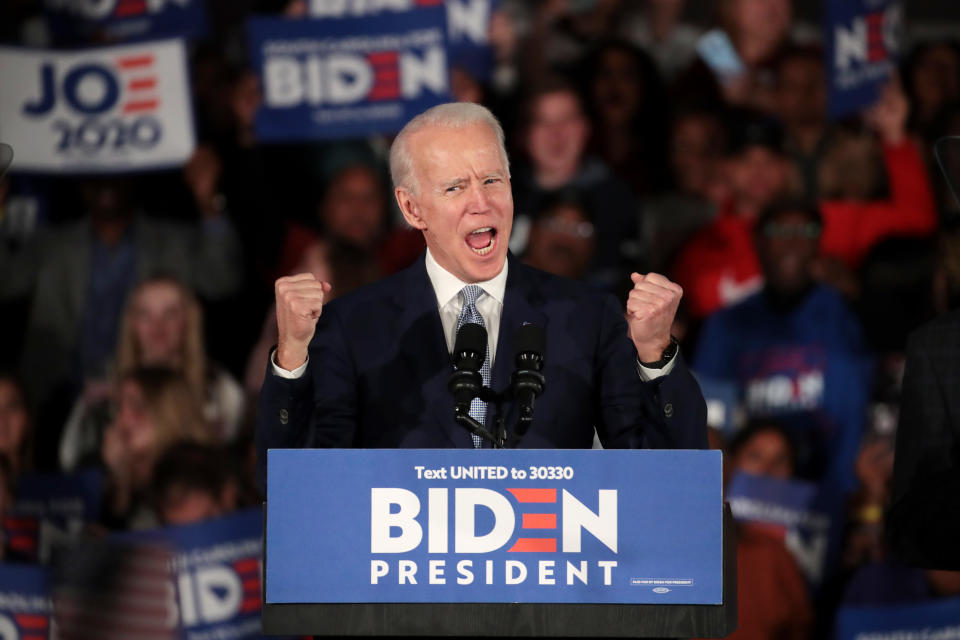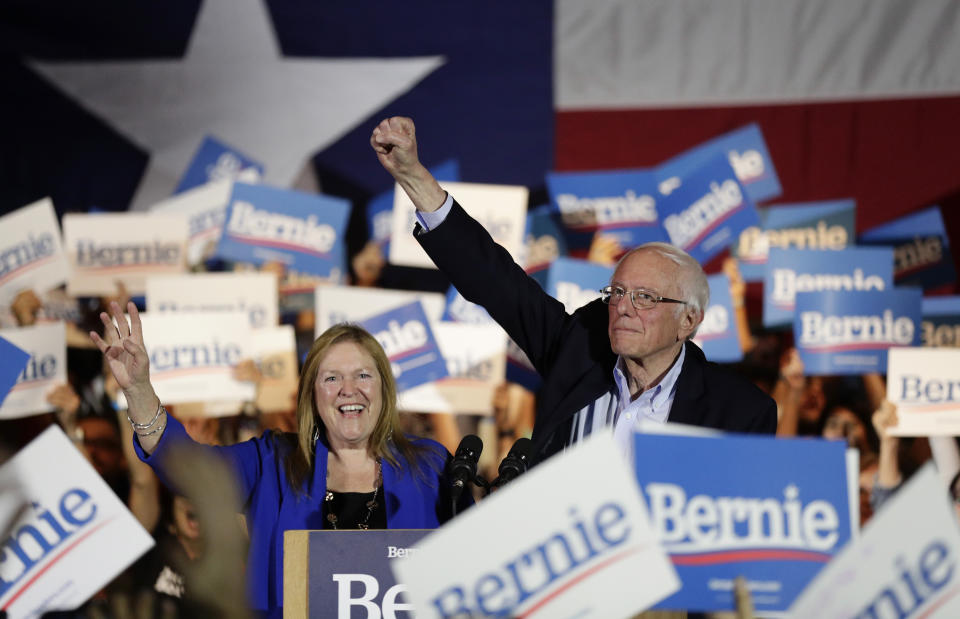South Carolina primary win puts Biden back in contention — but can he catch Bernie?

COLUMBIA, S.C. — After finishing a disappointing fourth in Iowa, a dismal fifth in New Hampshire and a distant second in Nevada, Joe Biden needed a big win in South Carolina on Saturday to keep his primary campaign alive.
He got one.
The question now is whether it will be enough: enough to resuscitate his formerly frontrunning bid, refill his empty coffers, reverse his stagnant poll numbers and propel him to the kind of comeback performance on Super Tuesday that could slow Bernie Sanders’s momentum — and perhaps leave Biden as the last Democrat standing between Sanders and the nomination.
We’ll find out in 72 hours.
“Let me talk directly to Democrats across America, especially those who will be voting on Super Tuesday: This is the moment to choose the path forward for our party,” Biden said in his victory speech at the University of South Carolina. “If Democrats want a nominee who’s a Democrat — a lifelong Democrat, a proud Democrat, an Obama-Biden Democrat — then join us. We have the option of winning big or losing big. That’s the choice.
“Most Americans don’t want the promise of revolution,” Biden added, implicitly contrasting himself with Sanders, a self-described democratic socialist who identifies as an independent in the Senate and frequently calls for “political revolution.” “False promises are deceptive. Talk of revolution isn’t changing anybody’s life. We need real changes right now.”

On the floor of the packed volleyball center, Biden’s supporters agreed. “I think tonight will be a big boost for Biden, like a springboard to Super Tuesday,” Brandon Koon, 34, told Yahoo News. “After tonight, it’s like Biden and Bernie. South Carolina launched [Barack] Obama to the White House, and I’m hoping it does the same for Joe.”
The Palmetto State was always supposed to be Biden’s firewall: a place where the Democratic primary electorate is more than 55 percent black, where nearly every black leader, including the Democratic kingmaker Rep. James Clyburn, endorsed him and where he spent considerable amounts of time when he was Obama’s vice president. Biden even summered on Kiawah Island.
But after Biden’s weak showings in Iowa and New Hampshire, his longtime polling lead here, once as large as 25 percent, collapsed. By last week, Sanders, hot off winning the most votes in all three early states, had pulled within three points of catching up.

So how did Biden turn it around and wind up defeating Sanders by nearly 30 points in a crowded field? And what does it mean heading into the single biggest day on the primary calendar, when a full third of all Democratic delegates will be up for grabs in 14 states, plus American Samoa and citizens living abroad?
“Joe Biden fought to earn every vote in South Carolina, a state where he has deep relationships and a long history,” T.J. Ducklo, Biden’s national press secretary, told Yahoo News. “You saw that on display all week, but especially during Jim Clyburn's powerful endorsement, which came the morning after a commanding debate performance. We expect a strong finish in South Carolina to propel us into Super Tuesday, where a lot of the states look demographically like South Carolina does, and where the VP has an unmatched network of endorsers and supporters across communities.”
It’s Ducklo’s job to paint the rosiest possible picture for his boss. But he has a point. Biden’s silver medal in Nevada last Saturday gave him a toehold: a bit of good news after a run of bad. Sure, he lost to Sanders by 26 percentage points, but he also beat the other Bernie alternatives (Pete Buttigieg, Elizabeth Warren and Amy Klobuchar) by substantial margins — and won black voters by 10.
Then came Tuesday’s debate in Charleston, where a feisty Biden got good marks from pundits and was the only candidate who significantly improved his favorability rating among viewers, according to a before-and-after poll. The next morning Biden scored Clyburn’s coveted endorsement; the House minority whip went on to compare Sanders to the failed 1972 Democratic nominee George McGovern, who got “everybody yelling about what a great victory” he would win, then “carried one state.” Tim Kaine, the Virginia senator who was Hillary Clinton’s running mate in 2016, announced his support for Biden the next day.
All of this added up to skyrocketing last-minute poll numbers for Biden, as well as a kind of permission slip for South Carolina Democrats — especially the state’s core bloc of older, more moderate black voters who backed Biden at the start but began to waver when his electability seemed in doubt after the early primaries and caucuses. According to Saturday’s exit poll, South Carolina Democrats never really warmed to Bernie; many were likely waiting for a reason to return to Joe. Overall, 77 percent of South Carolina primary voters expressed a favorable opinion of Biden; among black voters, that number hit 84 percent. As for Sanders, his S.C. favorability rating was 26 percent lower than Biden’s overall, and 27 percent lower among blacks. Forty nine percent of late deciders said they backed Biden; 16 percent supported Sanders. Meanwhile, about a quarter of the electorate, and a third of black voters, said Clyburn’s late endorsement was a critical factor for them. Ultimately, Biden wound up winning 61 percent of the black vote.

“I wavered for a while,” Harrison Brown, 81, told Yahoo News after one of Biden’s final South Carolina rallies Friday in Sumter. “When [former New York Mayor Mike] Bloomberg decided he was coming in, I was teetering. Throughout the African-American community, I feel like the solid feeling is ‘I don’t want to make a mistake and vote for the wrong person who can’t beat Trump.’ And that’s why you had some undecided. But as it gets down to the wire now, I think most of us are moving to Biden.”
But South Carolina is only one state — and it’s one where the cash-strapped Biden campaign invested more time and energy over the last 10 months than anywhere else. Will his success there translate on Super Tuesday?
It’s true that the Democratic nominating contest is about to move onto friendlier demographic turf for the former veep, who tends to outpace his rivals among black voters, while also doing well among Latinos. In Iowa, caucus-goers were 91 percent white, 3 percent black and 4 percent Latino. New Hampshire voters looked pretty much the same: 90 percent white, 6 percent black and only 2 percent Latino. But some of Super Tuesday’s biggest delegate prizes include California (25 percent Latino), Texas (32 percent Latino, 19 percent black), Virginia (26 percent black), North Carolina (32 percent black), Tennessee (32 percent black), Alabama (54 percent black), Oklahoma (14 percent black) and Arkansas (27 percent black).
Before South Carolina, surveys (though scarce) showed Biden leading or tied for the lead in Virginia, Oklahoma, North Carolina, Arkansas, Alabama and Tennessee; he was polling second behind Sanders in Texas.
But it remains to be seen whether Biden’s South Carolina triumph will help him overcome two huge challenges on Super Tuesday. On the plus side, the short turnaround after S.C. means he should be able to maintain his momentum and continue raising money at a clip of $1 million a day or faster, his pace for the last week or so. Within minutes of Biden’s win Saturday, former Virginia Gov. Terry McAuliffe, who is well connected to big Democratic donors, added his endorsement — a possible sign that other Democratic establishment figures, in an effort to unite behind a single challenger to Sanders, will come off the sidelines and throw their weight behind Biden in the days ahead.
Voters in Super Tuesday states could be receptive to such a push. “A lot of my friends in North Carolina are watching South Carolina,” North Carolina resident Tammy Green, 43, told Yahoo News at the Biden event in Sumter, S.C., on Friday. “I think they’re leaning Joe, but they’re watching the results.”
Still, Biden has been enormously outspent across the Super Tuesday map by Bloomberg, who is trying to appeal to many of the same moderate voters, and though the former New York City mayor has stalled after two faltering debate performances, he has been polling higher than the 15-percent delegate threshold in a lot of Southern states where Biden needs to do well. A pro-Biden Super PAC just announced a “low six-figure” digital Super Tuesday ad buy, and earlier this week the Biden campaign finally invested six figures of its own money in Super Tuesday spots. But that’s a drop in the bucket compared to Bloomberg’s half-billion-dollar ad blitz (not to mention what Sanders and others are spending). Even if Bloomberg underperforms on Tuesday, he could keep Biden from fully capitalizing on his South Carolina win.

Another problem is that Biden’s on-the-ground organization for Super Tuesday is nonexistent — he has one field office in California to Sanders’s 23 — and he has barely visited any of the states that will be voting. “Arkansas was, in my opinion, going to be a default Biden state,” Michael John Gray, the chairman of the Democratic Party of Arkansas, recently told the New York Times. “He hasn’t been here.” Sanders is already way ahead in polls of California and Texas, where most of Tuesday’s delegates are concentrated. By leaving winnable votes on the table, Biden’s inferior organization could limit any comeback and further pad Sanders’s delegate lead.
“In my view, the same old, same old kind of politics ... that doesn’t excite anybody isn’t going to be the campaign that beats Trump,” Sanders said Saturday night in Virginia, in a veiled swipe at Biden.
Even so, momentum matters — and after his resounding South Carolina victory, Biden may be the only Democrat who still has a shot at stopping Sanders.
“You hold in your hands the future of the Democratic Party,” Biden said during a rally at Spartanburg’s Wofford College the night before the primary. “You send me out of here with a victory that’s significant, then I think I’m going to be the next nominee.”
On Saturday, South Carolina gave Biden the opportunity he asked for. His performance on Super Tuesday will show whether he can take advantage of it.
_____
Read more from Yahoo News:
